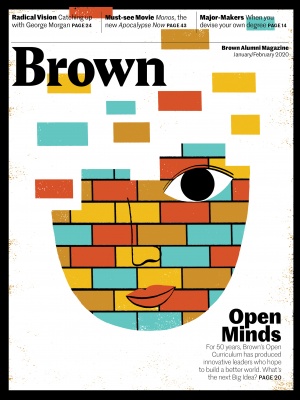Joy of Learning
Celebrating 50 years of the Open Curriculum
As soon as we started talking about the Open Curriculum’s 50th anniversary, we knew we wanted to dedicate an issue of the magazine to Brown’s signature educational philosophy. Who better to plan and edit it than Deputy Editor Louise Sloan ’88, herself a product of the OC? I’m pleased to turn over this space to her. Enjoy!—PJ
I was a student at Brown in the mid-1980s, concentrating in comparative literature. And every time I met with my adviser, Karen Newman—now the Owen Walker Professor of Humanities and Professor of Comparative Literature and English—she’d give me what I thought of as the “stop abusing the Open Curriculum” lecture. “You’ll be reading books the rest of your life, Louise,” she’d say. She wanted me to try new things, to open myself up to unfamiliar areas of knowledge—science, math, engineering—in order to broaden my understanding of the world and maybe even find a new passion.
Instead I dove deeper into my existing interests: languages, literature, philosophy, creative writing, critical theory. Yet Brown offered something very new: the ideal that generated the Open Curriculum, something President Christina H. Paxson has dubbed “constructive irreverence.” It’s the belief that established knowledge and structures are not just to be absorbed and followed but questioned and improved upon if need be, in order to create a better, more just world. And that we, as students, have both the freedom and the responsibility to do just that.
I’d skated through my secondary education almost completely disengaged and might well have dropped out of college if I’d been forced into a core curriculum. But at Brown, because the material was so challenging and because I had the freedom to immerse myself in whatever fascinated me, I had four years of experience working both hard and joyfully. I exited the Van Wickle Gates feeling passionate, engaged, and motivated, and it stuck—“engaged” was the new me.
Professor Newman might be pleased to know that since graduation I’ve taken deep dives into topics like marine biology, encryption, blood biochemistry, cancer nanotechnology—and I’ve been excited by the challenge. I may not have studied math or science at Brown, but I learned how to think critically and handle difficult material. Most important, I experienced joy in learning, which made me both willing and able to branch out.
I’m hardly alone in feeling like the Open Curriculum is central to my intellectual identity and my life path. So do most alums BAM interviews—typically creative problem-solvers and innovative leaders driven by ideals and a sense of purpose. You’ll pretty much find the Open Curriculum on every page of every issue of the BAM. So for this commemorative edition, we wondered what we could do that’s any different. Pages of testimonials and tributes seemed like overkill—even to me, a true believer. What might actually be fresh and surprising to our readers, most of whom have Open Curriculum stories of their own?
We started by asking you for those OC experiences, and we were impressed by the power of the accounts we received—some positive, some not so much (see pages 29-31). Next, we delved into some hidden history, the trail-blazing work of Professor George Morgan. We also solicited smart ideas about what might come next. What innovations will Brown embrace in its next 50 years? In our campus news section, we highlighted a few of the ways the OC is operating right now, inspiring students to effect positive change and to create their own concentrations. But we kept our Beyond the Gates section the way it always is—basically OC on the road, full of stories of Brown alums doing what Brown alums do, taking initiative and making an impact on their worlds.




